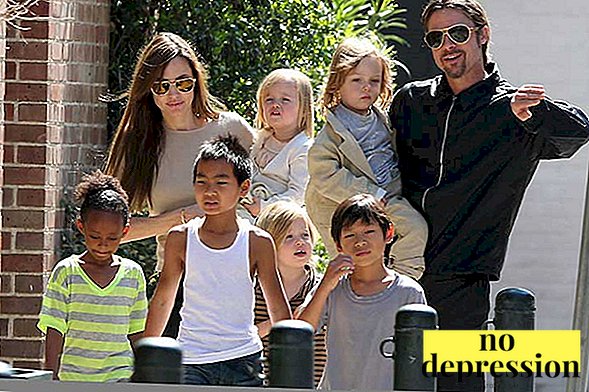The formation of speech in the baby occurs in several stages.
It directly associated with mental and intellectual development.
By the age of 3, the child should already speak sentences and utter all sounds.
With certain violations of mental development, there are also deviations in speech behavior. These pathologies include echolalia. She may be consequence of brain damage, but sometimes occurs in healthy children.
About the disease

Child echolalia is the rejection of the formation of speech, in which the child repeats words and expressions uncontrollably from the speech of other people.
Sometimes several times. However, he may not even understand the meaning of what is said.
This phenomenon peculiar to a child from one to twoas he learns to speak and repeats words and phrases after others.
Also, children of 3-4 years often copy the behavior of adults, including in speech. This is also considered a variant of the norm. In this way, the child acquires communication skills.
If echolalia does not pass after 4 years, then it is already considered a deviation and requires correction.
Often the disease is combined with ecopraxia (repetition of gestures and facial expressions). The frequency of the spread of pathology does not exceed 0.5%.
Such children have difficulties in social adaptation, the inability to study in a secondary school. The most difficult is for patients with echolalia. combined with mental retardation.
Classification of pathology

In medicine, the following types of deviations are distinguished: immediate and delayed.
Immediate - this is a deviation in which the patient immediately repeats the words or expressions heard from the interlocutor or on TV.
Physiological immediate echolalia peculiar to children under 3 years.
Pathological immediate echolalia performs certain functions:
- Attempt to support the conversation. The patient does not have enough vocabulary to express his thoughts, therefore with the help of repetition he seeks to build a dialogue.
- Expression of consent. Repetition is the replacement of the word "yes." For example: "Peter wants to walk?". "Peter wants to walk."
- The desire to understand what the interviewee says. The patient can not understand the meaning of what is said in the mind, so he tries to do it out loud.
Deferred rejection involves repeating what you hear after a while, after a few minutes or even hours.
This creates certain difficulties in diagnosis, as parents do not immediately notice the pathological speech.
Usually delayed type peculiar to children with autism. In this case, the repetition performs certain tasks:
- Attempt to handle the stress and feel positive emotions.
- Express emotions. For example, a phrase in a child is associated with joy; he will repeat it out of place in order to convey his positive emotions.
- Systematization of informationwhich the child received for the day.

Echolalia happens full and partial. When full, the patient automatically repeats the expression, not realizing their meaning. With a partial patient half understands what he is saying.
Symptoms and signs
Clinical picture echolalia depends on the initial disease. Common symptoms are:
- Repeat someone else's speech immediately or after a certain time. Often the said phrases are out of place.
- Too low or loud speech.
- No facial expressions.
- There is no response to the name.
- Distorted intonation.
- Hallucinations
- When talking, the child does not look at the interlocutor, but on the sides.

If echolalia has developed against autism, then the child has stereotypical behavior.
That is, he repeats the same rituals, does not communicate with peers, has a meager vocabulary, loops in one lesson.
Causes of development
The main cause of echolalia is disinhibition of the imitative reflex.
This occurs when functional or organic lesions of certain brain lobes. In the frontal lobe, hyper excitation of neurons occurs and the balance between inhibition and excitation is disturbed.
Provocative factors for the appearance of the disease are certain mental disorders.:
- autism;
- schizophrenia;
- Rett syndrome;
- Pick's disease;
- encephalopathy;
- oligophrenia;
- neoplasms in the brain;
- head injuries;
- neuroinfection (meningitis, encephalitis).
Often, echolalia is combined with dyslexia and dysphasia. The child can not master the skills of writing and reading, while his intellectual development may be normal.

Violation of the formation of speech skills may occur due to the following factors:
- Severe pregnancy when the formation of brain structures is disturbed.
- Birth injuries in which the brain is damaged.
- Hypoxia of the fetus.
- Taking drugs, alcohol and drugs during pregnancy.
Complications and consequences
Echolalia is a serious disorder that, if not corrected, leads to problems in adulthood. A child cannot communicate with peers, make friends, study in a regular school.
Later, patients experience difficulties in finding a job and establishing personal relationships. Usually they live alone, many need the help of their parents for the rest of their lives.
In addition, the patient other disorders are progressing.:
- Belated speech development.
- Insufficient formation of cognitive skills (memory, attention, thinking).
- Lagging emotional development.
Diagnostics

If parents notice signs of echolalia in children after 3 years, then immediately contact a specialist.
At the initial stage, the pathology is amenable to correction.
For a child psychiatrist and a neurologist, diagnosis is not difficult. It is enough for the doctor to talk with the child, to conduct a series of specific tests. To identify the causes of the disease prescribed instrumental studies:
- electroencephalogram. It detects foci of excitation in the brain;
- MRI of the brain. Diagnoses tumors, cysts, impaired cerebral circulation, increased intracranial pressure.
You should also get an otolaryngologist consultation to rule out echolalia that has developed due to hearing loss.
Inspection speech therapist necessary for the detection of dyslexia and other speech disorders.
DNA research required if genetic diseases are suspected (Rett syndrome and Tourette syndrome). If mutated genes are found, the patient cannot be cured.
Treatment
Important identification of the root causes of echolalia. Usually, after the elimination of the underlying disease, the child's speech normalizes. Functional echolalia at an early age can be treated without medication.
Parents should use certain techniques to ensure that the child finds the right ways to express thoughts and emotions. What to do:
- Normalize the psychological situation in the family. The kid should feel confident and calm, not have fears and negative emotions.
- Write the baby in the section, circles, where he will find communication with peers.
- Build question expressions in such a way that they require clear answers "Yes" or "No".
- Explain to the child when you can answer out loud, and when not. Often children repeat the phrase out of habit.
- Demand that the baby speak from the first person, and not from the third. Contact him from the second person. Often parents are to blame for echolalia when they say: “Mitya wants to eat?” Instead of “Do you want to eat?”.
- Replenish the vocabulary of the child. This can be done with the help of reading books, watching educational films, intellectual games.

In a difficult situation, a more serious correction is required. It lies in the coordinated work of a speech therapist, psychologist, neurologist, and psychiatrist.
Preparations
Drug therapy is used to treat not echolalia itself, but for therapy of the underlying diseaseassociated with organic brain damage. Children usually prescribe the following drugs:
Nootropics. Usually appointed Pantogam. It improves the processes of tissue metabolism in the brain neurons, helps to normalize the functioning of the brain. The effectiveness of Pantogam with echolalia has been proven by numerous studies.
After 2-3 months of monotherapy, the following results are observed:
- increased speech attention;
- vocabulary grows many times;
- attention improves;
- hyperactivity is reduced.

If after the first course you cannot achieve the desired results, then repeated therapy after a month's break.
Neuroleptics are used in conjugating echolalia with schizophrenia. The choice of drugs and the dosage is determined by the doctor.
Psychostimulants (Deoxin, Metelin). Activate the mental sphere of the body, accelerate cognitive processes. Effective for the treatment of echolalia caused by injuries, neuroinfections.
However, drugs should be used carefully, as they are addictive. It is forbidden to use psychostimulants in Rett and Tourette syndromes, these funds aggravate the course of the disease.
Soothing herbal preparations (Valeriana, Glycine) help with hyperactivity, sleep disorders, restless behavior.
Drug therapy should be combined with speech therapy and psychotherapeutic techniques. In individual and group classes, children learn to express their thoughts correctly, correctly build sentences, and interact with other children.
Forecast

At the initial stage of the disease easy to correctwhen it is not caused by severe brain damage.
If parents comply with medical recommendations, then by school age the child will not differ from peers.
Harder things are with genetic diseases (Rett syndrome), which are accompanied by serious mental disorders and mental retardation. These diseases are incurable, it is only possible to teach the child some self-care skills.
It is also difficult to cure schizophrenia. With the help of long-term therapy, the disease is brought to the stage of remission, and speech is improving along with it. However, during periods of exacerbation, symptoms may return.
Successful learning, normal mental development depends on timeliness of diagnosis and correctness of treatment. It is important that the impact be comprehensive and successive, that is, a well-coordinated team of speech therapists, psychotherapists and parents must work.
Parents in communicating with babies should observe the following regulations:
- Do not interrupt the child when pronouncing phrases and words.
- Talk more, teach your baby to build the right speech.
- Encourage emotions expressed in the right ways.
- Do not allow the occurrence of stressful situations.
Echolalia as an independent violation occurs rarely. It is usually consequence of mental abnormalities or organic brain damage.
Functional impairment passes on its own and does not require a drug adjustment. If serious diseases are diagnosed, long-term treatment will be required and A complex approach. Of great importance is the attitude of parents, their willingness to help their child.
We remove echolalia with the help of creative stories:



